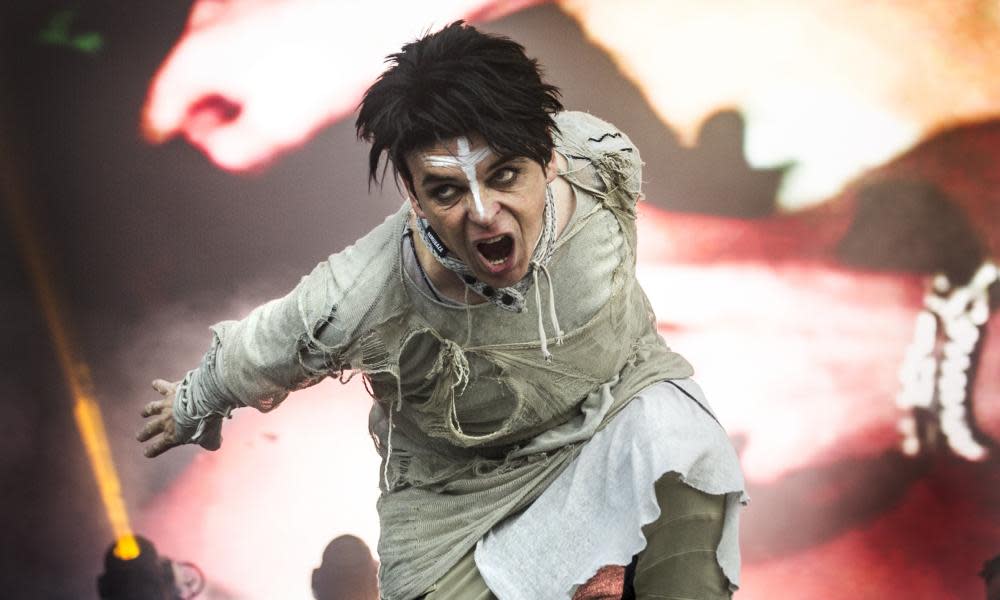Bluedot festival review – Gary Numan makes waves at science-pop mashup

Bluedot is like many UK music festivals: it offers bands and DJs, truckloads of glitter, street food, kids pulled around in wagons and so on. But it’s also entirely different. Rather than add tokenistic science bits to suit its environment – Jodrell Bank in Cheshire is home to the world’s third-largest steerable radio telescope – Bluedot has made science integral to its output in the form of talks, workshops and interactive stalls. It’s a place where people flaunt their geek bona fides, dressing as Stormtroopers or Star Trek characters. Here, wormholes and quantum biology are topics devoured as heartily as the various genres of music. One bit of Portaloo graffiti simply reads: “science”.
As for the music, Hot Chip frontman Alexis Taylor’s opening set weaves between disco grooves, cosmic country and guitar noodling. He wears a plastic cowboy hat and offers a pleasingly disorientating start to a festival that seems intent on creating sensory-shifting experiences. These occur in installations such as the inflatable luminarium – a spaceship-like labyrinth of tunnels and domes – as well as vast illuminated fake fungi, a giant Planet Earth sculpture and an area full of contraptions spitting fire like a homemade Mad Max set.

Back on stage, Manchester DJ Afrodeutsche and Sheffield trio International Teachers of Pop stir the evening into life. The former shifts from emotive techno that recalls the soundtrack to Twin Peaks into more unpredictable rhythms, while the latter’s self-described “nerd disco” is a mesh of bedroom dance moves and infectious pop melodies. Headliners the Flaming Lips play a rousing version of the theme from 2001: A Space Odyssey before bursting into Race for the Prize, with their usual explosion of confetti and balloons following to form a kaleidoscope of colour. Lysergic projections cover the huge telescope behind them during a hit-filled set, which honours the setting with versions of David Bowie’s Space Oddity and Starman.

If there were ever an anthem for this sort of festival, it’s the Dr Who theme, deployed by the Radiophonic Workshop on Saturday. Later on, Hookworms play a rocketing set, shifting between electronic-charged propulsions and full psychedelic wig-outs, while Gary Numan ditches the hits and focuses on his latest record, his set resembling Nine Inch Nails in its heavy industrial throb.
It’s testament to Future Islands’ tenacity that a group with a singer (Samuel T Herring) who rockets between soulful crooning and death-metal screams have reached headliner status, even though they do feel a little stretched for material come the end of their set. After hours, Helena Hauff plays pummelling techno to people in lab coats and homemade rocket backpacks.
“I love the sound of pond weed,” says Jez Riley French on Sunday, talking about his unusual sound recordings. Acid Mothers Temple offer some freak-out psychedelia in the sweltering sun and the sniper suit-clad Snapped Ankles deliver a set of woodland kraut-disco as they hammer away with logs as instruments, creating a sonic middle ground between nature and technology. The Chemical Brothers close the festival with a monstrously loud performance, unfurling 90 minutes of constant tease and release.
Bluedot is the sort of place where you’ll hear Schrödinger’s cat referenced daily and, much like that theoretical exploration of parallel universes, the festival exists to explore duality. Music and science may appear to some like seemingly opposing practices, but the festival’s collision of information and entertainment proves a successful experiment.

 Yahoo News
Yahoo News 
